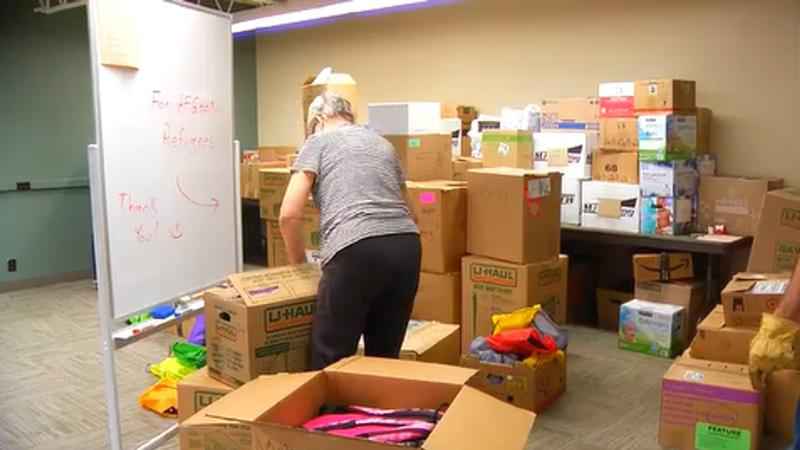Bloomington church sending donations to Fort McCoy for Afghan refugees; Minnesotan from Afghanistan among those helping
[anvplayer video=”5061869″ station=”998122″]
Volunteers at Hometown Church in Bloomington are packing parcels of hope.
"We have an opportunity to help or show mercy to people in need," Rev. Jeff Groen said. "As a church, we want to love our neighbors and there are expressions of that, a lot of things you can do."
One of the things this church is doing — among four in the metro — is collecting donated clothes, toiletries, diapers, backpacks and shoes.
A roomful of supplies heading to Fort McCoy in Wisconsin and the 13,000 Afghan refugees now living there.
"I would say we’ve filled a 12-by-12 room up to 18-high," Groen said. "Some of the Afghans come with nothing but their clothes and their sandals. We’ve gotten supplies from the church community as well as our church members."

[KSTP]
Among the volunteers is Rizwan Qazizada, who moved to Minnesota from Afghanistan in 2014.
"It’s a very good feeling," he said quietly. "I feel so proud to help these people. I worked with the U.S. military as an interpreter in the past, from 2011 to 2014."
It hasn’t been an easy road for Qazizada, who’s now 29.
After settling in the metro, he later got married, but his wife and now 18-month-old daughter remained in Afghanistan — not by choice.
"My wife, she waited for her visa for four years, and she finally got her visa," he recalled. "I went to Afghanistan in August to get her here, but when I was there, the government collapsed, and that’s how we were stuck there."
Qazizada says it was a harrowing, frightening time for Afghans trying to get out of the country.
"There were Taliban standing outside the airport," he remembered. "I’ve seen some people, their U.S. passports were taken by the Taliban, their other documents were taken by the Taliban."
He also says his background as an interpreter proved dangerous.
"I got beaten up, too. A lot of people were beaten by the Taliban," Qazizada said. "The Taliban knew that people trying to come to the airport, most of them were working with the U.S. government or the previous government."
Still, he says he and his young family were lucky. They were able to escape in a C-17 military transport.
Sixteen family members, he says, remain in Afghanistan. Some are among those moving from house to house, trying to elude the Taliban.
"They are targeting people… they are killing them at night, and they are going to their homes and searching for people who worked for the U.S. government," Qazizada noted. "A lot of people left their homes, they are moving to a different city, so they cannot be recognized. But it’s a chaotic situation there."
For now, he says, he’s just trying to help.
"I know the frustration of those people who are at Fort McCoy," Qazizada noted. "They need anything now, and I really appreciate these people helping them out."
Hometown Church now has two "Welcome Teams" to help when Afghan refugees being resettling in the metro. They’ll coordinate doctor visits, get transportation for the kids going to school and even help navigate the Metro Transit system.
Church staffers will be taking those donated items to Fort McCoy on Thursday. They hope to help those who’ve lost almost everything but gained their freedom.
"None of these people wanted to leave, so it’s a challenge for them," Groen declared. "They’re grieving a lot of loss. But they’re here and the ones that I’ve met are happy to be safe, glad that their lives aren’t at risk."
After a difficult year, Qazizada says he has some welcome family news.
He, his brother and their families moved into a home in Apple Valley this week.
A second brother, just 22, who got to the U.S. in August, was at Fort Lee in Virginia until his arrival in Minnesota on Tuesday.
Qazizada says he hopes to eventually help get the rest of his family safely out of Afghanistan.
"I’m trying to bring them here because they’re not safe there," he said. "If the situation is like that, we will not be allowed to go back to Afghanistan, actually. Afghans need the help now, and really appreciate those who are helping."